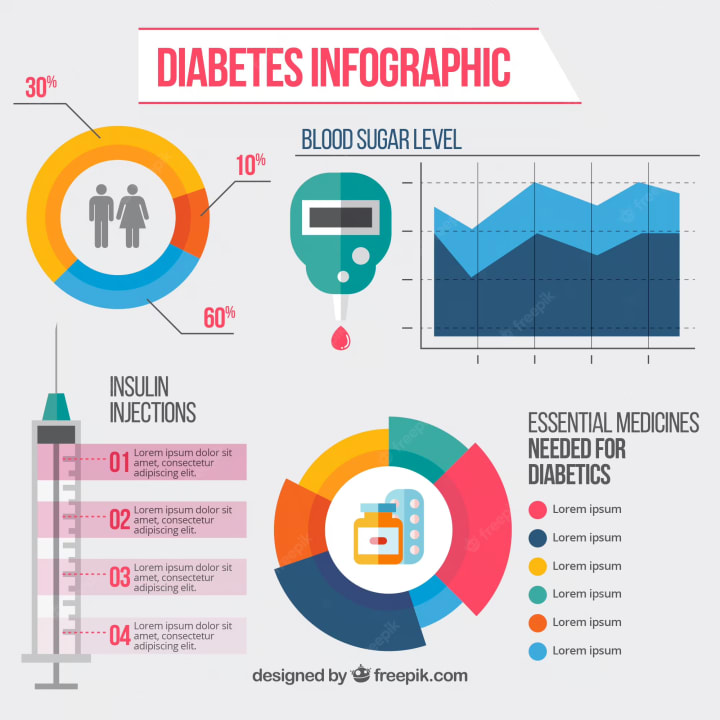Diabetes Management
Blood Sugar The Silent Killer

The Ultimate Guide to Diabetes Management: Controlling Blood Sugar Levels for a Healthier Life

Understanding Diabetes Management
Living with diabetes can be challenging, but with proper management, you can lead a healthier life. Diabetes management involves taking control of your blood sugar levels through various strategies. By understanding the importance of controlling blood sugar levels and implementing effective management approaches, you can minimize the complications associated with diabetes.
Diabetes is a chronic condition that affects the way your body metabolizes glucose, a sugar that serves as the primary source of energy. When blood sugar levels are consistently high, it can lead to serious health problems such as heart disease, kidney damage, and nerve damage. By actively managing your diabetes, you can reduce the risk of these complications and improve your overall well-being.
Secret Herbs that can Reverse diabetes
The Importance of Controlling Blood Sugar Levels
Controlling blood sugar levels is crucial for individuals with diabetes. Elevated blood sugar levels can lead to short-term symptoms like increased thirst, frequent urination, fatigue, and blurred vision. Over time, uncontrolled diabetes can cause long-term complications that can severely impact your health.
When blood sugar levels are consistently high, it puts a strain on your organs and blood vessels. This can lead to the development of cardiovascular diseases, such as heart attacks and strokes. Additionally, high blood sugar levels can damage the nerves and blood vessels in your extremities, leading to conditions like diabetic neuropathy and peripheral artery disease.
By actively managing your blood sugar levels, you can minimize the risk of these complications and improve your quality of life. Regular monitoring, adherence to diet and exercise plans, and proper medication use are key components of effective blood sugar control.
Smart Blood Sugar Plan to Kill Diabetes
Types of Diabetes and Their Management Approaches
There are several types of diabetes, with the most common being type 1 and type 2 diabetes. Type 1 diabetes is an autoimmune condition where the body does not produce enough insulin, while type 2 diabetes occurs when the body becomes resistant to insulin or does not produce enough of it.
The management approaches for type 1 and type 2 diabetes differ slightly, but the primary goal remains the same – to control blood sugar levels. Individuals with type 1 diabetes often require insulin injections to regulate their blood sugar, while those with type 2 diabetes may manage their condition through lifestyle modifications, oral medications, or insulin therapy.
It is important to work closely with your healthcare team to determine the most appropriate management approach for your specific type of diabetes. They will provide guidance on medication usage, lifestyle changes, and regular check-ups to ensure your diabetes is well-controlled.
WHAT Foods you should be having to control diabetes
Diet and Nutrition for Diabetes Management
Proper diet and nutrition play a significant role in diabetes management. When it comes to managing blood sugar levels, it is essential to pay attention to the types and quantities of carbohydrates consumed. Carbohydrates have the most significant impact on blood sugar levels, so it is crucial to choose carbohydrates that are slowly digested and have a minimal impact on blood sugar.
Fiber-rich foods, such as whole grains, fruits, and vegetables, can help regulate blood sugar levels by slowing down the absorption of glucose. Including lean proteins, healthy fats, and a variety of nutrient-dense foods in your diet can also contribute to better diabetes management.
Portion control is another important aspect of a diabetes-friendly diet. By monitoring the size of your meals and snacks and spacing them evenly throughout the day, you can prevent blood sugar spikes and maintain more stable levels.
“Healthy” Foods that are causing Insulin Spikes
Exercise and Physical Activity in Diabetes Management
Regular exercise and physical activity are vital components of diabetes management. Physical activity helps improve insulin sensitivity, allowing your cells to better utilize glucose for energy. It can also aid in weight management, reduce blood pressure, and improve cardiovascular health.
When designing an exercise plan, aim for a combination of aerobic exercises, strength training, and flexibility exercises. Aerobic exercises, such as brisk walking, swimming, or cycling, help lower blood sugar levels and improve heart health. Strength training exercises, such as lifting weights or using resistance bands, can increase muscle mass and improve insulin sensitivity. Flexibility exercises, such as yoga or stretching, can enhance mobility and reduce the risk of injuries.
Before starting any exercise program, it is essential to consult with your healthcare team to ensure it is safe and appropriate for your individual needs. They can provide guidance on the duration, intensity, and type of exercises that will best suit your diabetes management plan.
Why “Yoyo” dieting & very healthy diet is spoiling your health
Monitoring Blood Sugar Levels
Regular monitoring of blood sugar levels is essential for effective diabetes management. It allows you to track how your body responds to different foods, medications, and activities, enabling you to make necessary adjustments to maintain optimal blood sugar control.
There are various methods for monitoring blood sugar levels, including fingerstick testing, continuous glucose monitoring (CGM) systems, and flash glucose monitoring. Fingerstick testing involves using a glucose meter to obtain a small blood sample from your fingertip. CGM systems and flash glucose monitoring provide continuous or on-demand glucose readings through a small sensor placed on your skin.
By consistently monitoring your blood sugar levels, you can identify patterns, understand how your body responds to different factors, and make informed decisions about your diabetes management plan.
What is Smart Blood Sugar Plan
Medications for Diabetes Management
In addition to lifestyle modifications, medications are often an essential part of diabetes management. The type of medication prescribed will depend on the type of diabetes, the severity of the condition, and individual needs.
For individuals with type 1 diabetes, insulin therapy is necessary to regulate blood sugar levels. This may involve multiple daily injections or the use of an insulin pump. Type 2 diabetes management often begins with oral medications that help improve insulin sensitivity or stimulate insulin production. In some cases, insulin therapy may be required if oral medications are not sufficient.
It is crucial to take medications as prescribed and follow the instructions provided by your healthcare team. They can guide you on the proper dosage, timing, and potential side effects of the medications to ensure their effectiveness in managing your diabetes.
Many methods to regulate blood sugar
Alternative Therapies for Diabetes Control
In addition to conventional medications and lifestyle changes, some individuals may explore alternative therapies to help manage their diabetes. These therapies can include herbal supplements, acupuncture, yoga, and mindfulness techniques.
While some alternative therapies may show promise in diabetes management, it is important to approach them with caution. Always consult with your healthcare team before incorporating any alternative therapies into your diabetes management plan. They can provide guidance on the safety, effectiveness, and potential interactions with other medications or treatments.
Tips for Managing Diabetes in Everyday Life
Managing diabetes requires ongoing commitment and dedication. Here are some tips to help you navigate everyday life with diabetes:
Educate yourself: Learn as much as you can about diabetes, its management, and potential complications. Knowledge empowers you to make informed decisions.
Build a support network: Seek support from family, friends, or diabetes support groups. Having a supportive network can provide emotional support and practical advice.
Stay organized: Keep track of medications, blood sugar readings, and appointments. Utilize tools like smartphone apps or diabetes management journals to stay organized.
Prioritize self-care: Take time for yourself and engage in activities that promote relaxation and stress management.
Conclusion:
Effective diabetes management is essential for maintaining good health and preventing complications. By understanding the importance of controlling blood sugar levels, adopting a healthy diet, engaging in regular physical activity, monitoring blood sugar levels, taking prescribed medications, and considering alternative therapies, you can take control of your diabetes and lead a healthier life.
Remember, managing diabetes is a lifelong journey that requires continuous learning and adaptation. Stay informed, seek support, and work closely with your healthcare team to develop a comprehensive diabetes management plan that suits your individual needs. With the right strategies and support, you can successfully manage your diabetes and enjoy a fulfilling life.





Comments
There are no comments for this story
Be the first to respond and start the conversation.